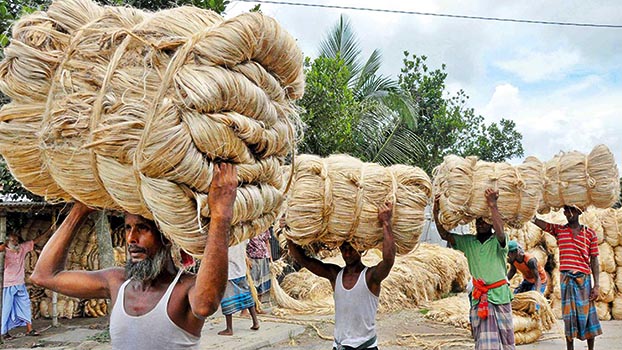Jute can drive the economy, yet again


Jute, the golden fiber of Bangladesh may bring in a golden future for the country, and contribute to becoming the new growth driver of the economy.
Experts said, jute is turning out to be an important natural and environment-friendly raw material for multifarious uses.
The demand for jute is increasing at home and abroad against the backdrop of the global awareness towards ‘green’ solutions, they added.
It is high time to focus on new and potential export items, like jute and jute goods in order to come out of overdependence on readymade garments, they mentioned.
The export earnings from the jute and jute-made goods witnessed a healthy growth during the July-May period in the current fiscal despite the ongoing worldwide shutdown due to the coronavirus pandemic.
The earnings from this sector secured second place after the readymade garments (RMG) pushing down the leather sector to the third place for the first time since losing its glory as the most export earning product as well as the golden fibre.
Export earnings of most of the products including the RMG sector of the country have shown negative growth during the time.
The country’s overall export earnings stood at around $30.96 billion in the first 11 months of the fiscal year, which is 19 percent less than that in the same period last fiscal year and 25 percent less than the target.
Export earnings from readymade garment (RMG) aslo missed the target by 26 percent in the July-May period and dropped 18.74 percent year-on-year to $25.7 billion.
However, the export earnings from the jute and jute-made goods stood at $817.97 million during July-May period in the current fiscal year, 2019-20, which is 5.74 percent more than the earnings in the same period of the previous fiscal, according to the Export Promotion Bureau (EPB).
It is also higher than the strategic export target of 8.69 percent during the period of the current fiscal.
Economists said the demand for jute and jute products has increased due to the reduction in the use of polythene in the world in response to the demands of environmentalists.
Hence, it is high time the government expands this sector through ensuring quality and diversifying the market across the globe to boost the export earnings during the corona crisis, they added.
Textiles and Jute Secretary, Lokman Hossain Mia said jute has played a helpful role in reviving the country's export sector amid corona pandemic.
He said the demand for jute-made goods is growing abroad, especially in Europe and other Western countries as people have become much more aware of using natural fibre.
“We are producing newer jute products with different dimensions, besides taking steps to make effective branding of local jute products in the international market,” he added.
For this, the export and variety of jute-made goods are gradually increasing, he further said.
Mia said the government has extended all support along with cash incentives for ensuring product diversification, modern machinery, and equipment to boost this sector.
President of Bangladesh Jute Diversified Products Manufacturers and Exporters Association and Managing Director of Creation Private Limited, Rashedul Karim Munna said the potential of jute is endless due to the production of multiple products.
Even if it can capture 10 percent of the potential international market, it is possible to earn Tk 50,000 crore a year with this jute alone, he added.
Making billions of dollars a year from the jute industry next year is not a dream at all, he said adding, for this, we have to set up modern technology based factories.
In addition, in order to enter the product in the international market, it is necessary to increase the research and create skilled manpower in the country to make the product as per the demand of the market.
Besides, large investment is required to increase the mechanical facilities, Munna said adding, “For this, the government needs to make the private sector strong as well as reorganize the state-owned factories and institutions.”
There are some 22 state-owned jute mills and some 200 private sector jute mills in the country.



